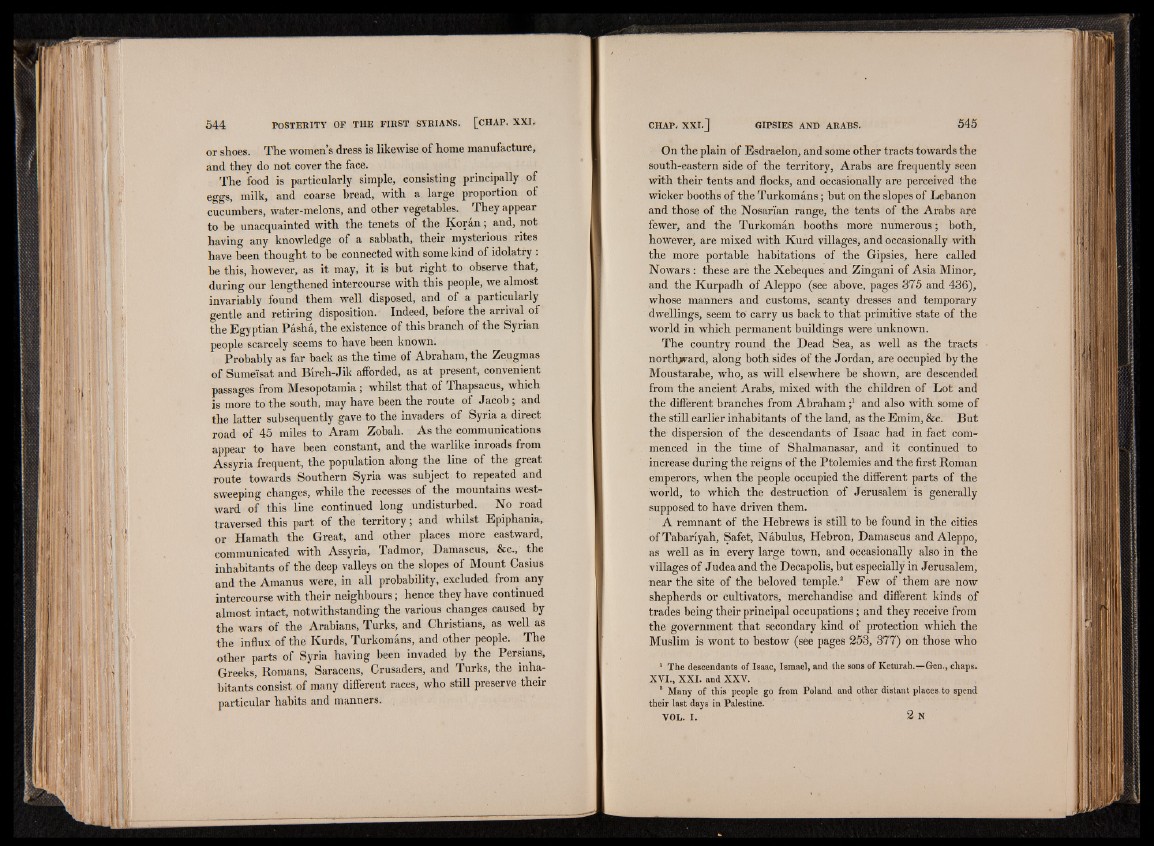
or shoes. The women’s dress is likewise of home manufacture,
and they do not cover the face.
The food is particularly simple, consisting principally of
eggs, milk, and coarse bread, with a large proportion of
cucumbers, water-melons, and other vegetables. They appear
to be unacquainted with the tenets of the Koran; and, not
having any knowledge of a sabbath, their mysterious rites
have been thought to be connected with some kind of idolatry:
be this, however, as it may, it is but right to observe that,
during our lengthened intercourse with this people, we almost
invariably found them well disposed, and of a particularly
gentle and retiring disposition. Indeed, before the arrival of
the Egyptian Pasha, the existence of this branch of the Syrian
people scarcely seems to have been known.
Probably as far back as the time of Abraham, the Zeugmas
of Sumeisat and Bireh-Jik afforded, as at present, convenient
passages from Mesopotamia ; whilst that of Thapsacus, which
is more to the south, may have been the route of Jacob; and
the latter subsequently gave to the invaders of Syria a direct
road of 45 miles to Aram Zobali. As the communications
appear to have been constant, and the warlike inroads from
Assyria frequent, the population along the line of the great
route towards Southern Syria was subject to repeated and
sweeping changes, while the recesses of the mountains westward
of this line continued long undisturbed. No road
traversed this part of the territory; and whilst Epiphania,
or Hamath the Great, and other places more eastward,
communicated with Assyria, Tadmor, Damascus, &c., the
inhabitants of the deep valleys on the slopes of Mount Casius
and the Amanus were, in all probability, excluded from any
intercourse with their neighbours; hence they have continued
almost intact, notwithstanding the various changes caused by
the wars of the Arabians, Turks, and Christians, as well as
the influx of the Kurds, Turkomans, and other people. The
other parts of Syria having been invaded by the Persians,
Greeks, Romans, Saracens, Crusaders, and Turks, the inhabitants
consist of many different races, who still preserve their
particular habits and manners.
On the plain of Esdraelon, and some other tracts towards the
south-eastern side of the territory, Arabs are frequently seen
with their tents and flocks, and occasionally are perceived the
wicker booths of the Turkomans; but on the slopes of Lebanon
and those of the Nosari'an range, the tents of the Arabs are
fewer, and the Turkoman booths more numerous; both,
however, are mixed with Kurd villages, and occasionally with
the more portable habitations of the Gipsies, here called
Nowars : these are the Xebeques and Zingani of Asia Minor,
and the Kurpadh of Aleppo (see above, pages 375 and 436),
whose manners and customs, scanty dresses and temporary
dwellings, seem to carry us back to that primitive state of the
world in which permanent buildings were unknown.
The country round the Dead Sea, as well as the tracts
northjirard, along both sides of the Jordan, are occupied by the
Moustarabe, who, as will elsewhere be shown, are descended
from the ancient Arabs, mixed with the children of Lot and
the different branches from Abrahamand also with some of
the still earlier inhabitants of the land, as the Emim, &c. But
the dispersion of the descendants of Isaac had in fact commenced
in the time of Shalmanasar, and it continued to
increase during the reigns of the Ptolemies and the first Roman
emperors, when the people occupied the different parts of the
world, to which the destruction of Jerusalem is generally
supposed to have driven them.
A remnant of the Hebrews is still to be found in the cities
ofTabariyah, Safet, Nabulus, Hebron, Damascus and Aleppo,
as well as in every large town, and occasionally also in the
villages of Judea and the Decapolis, but especially in Jerusalem,
near the site of the beloved temple.2 Few of them are now
shepherds or cultivators, merchandise and different kinds of
trades being their principal occupations; and they receive from
the government that secondary kind of protection which the
Muslim is wont to bestow (see pages 253, 377) on those who
1 The descendants of Isaac, Ismael, and the sons of Keturah.—Gen., chaps.
XVI., XXI. and XXV.
2 Many of this people go from Poland and other distant places to spend
their last days in Palestine.
VOL. I. 2 N